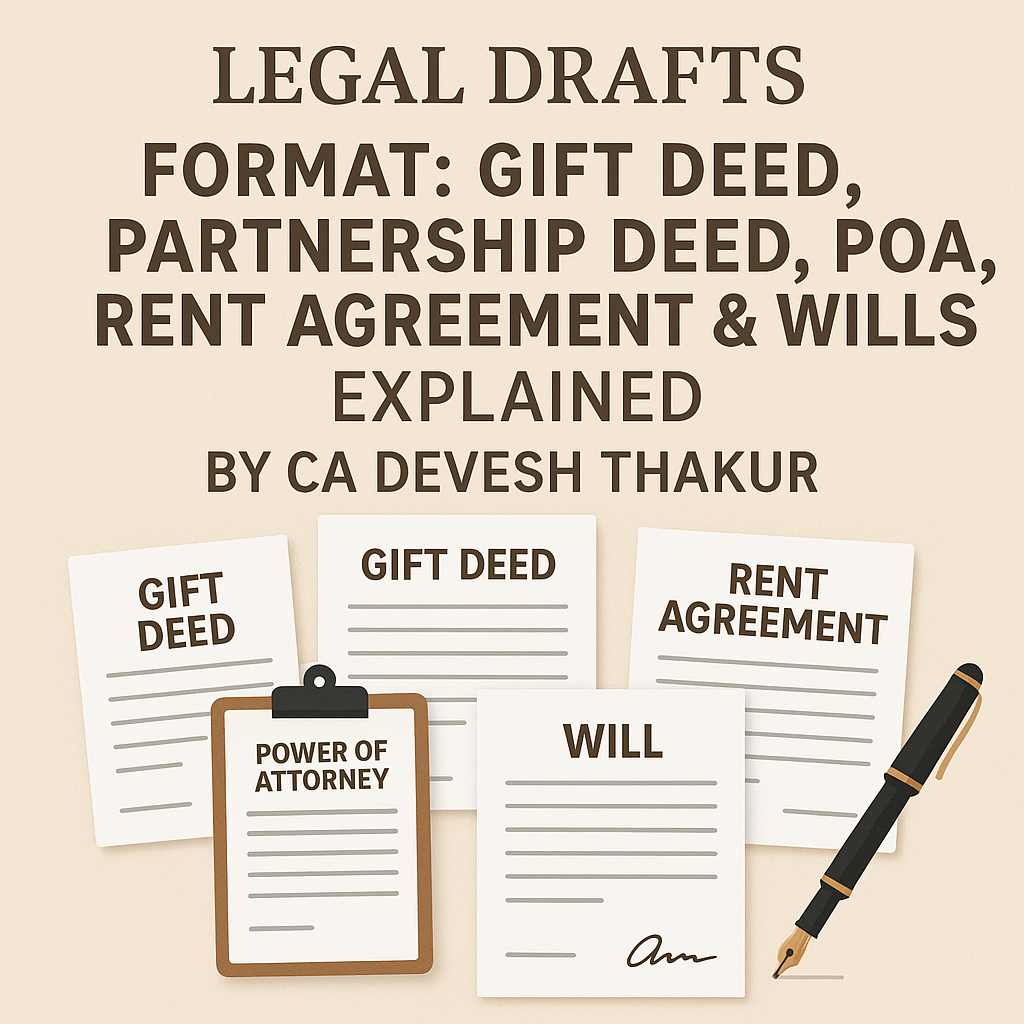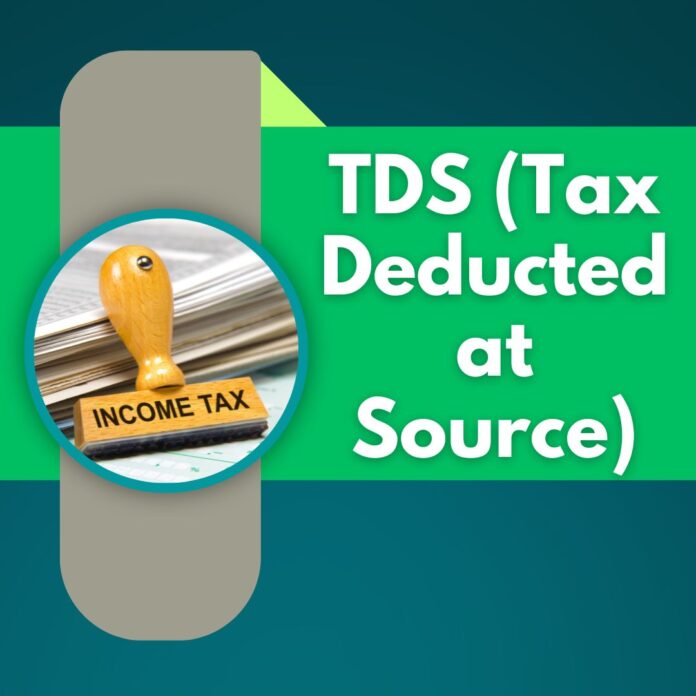Comprehensive Guide to Legal Drafts: Gift Deeds, Partnership Deeds, Power of Attorney, Rent Agreements & Wills
In today’s legal and financial world, having the right documentation is essential. Whether you’re gifting property, managing a partnership, delegating authority, leasing property, or planning your estate — well-drafted legal deeds and agreements play a vital role. Here’s a complete guide to some of the most commonly used legal documents.
1. Gift Deed
A Gift Deed is a legal document used to voluntarily transfer movable or immovable property from one person (donor) to another (donee) without any exchange of money.
(a) Gift Deed for Immovable Property
This includes the gifting of land, house, flat, or any real estate.
Key Clauses:
- Description of the immovable property
- Free consent declaration
- No consideration involved
- Stamp duty and registration mandatory under the Indian Registration Act
Use Case: Parents gifting residential property to children.
(b) Gift Deed of Bank Balance (NRI)
Used when an NRI transfers bank deposits/savings to a family member in India.
Key Clauses:
- Donor and Donee details with residential status
- Specific bank details and amount gifted
- Declaration of no tax liability
Use Case: NRI gifting ₹5 lakhs to a sibling’s Indian savings account.
(c) Gift Deed for Intellectual Property
For gifting copyrights, trademarks, patents, or designs.
Key Clauses:
- Description of the IP (with registration number if applicable)
- Irrevocable transfer of rights
- Royalty clause (if any)
- Jurisdiction
Use Case: Author gifting publishing rights to a trust or university.
(d) Gift Deed for Movable Property
Covers gifting of assets like jewellery, vehicles, shares, furniture, etc.
Key Clauses:
- Description and valuation of movable assets
- Delivery clause
- Witness details
Use Case: Gifting family heirloom jewellery to a daughter.
(e) Gift Deed for Transfer of Shares
Used to transfer equity shares from one person to another as a gift.
Key Clauses:
- Company name and number of shares
- PAN, Demat account of donor and donee
- Declaration under Companies Act
- Board resolution format (if needed)
Use Case: Transferring shares of a private company between siblings.
2. Partnership Deed
A Partnership Deed defines the rights, duties, and obligations of partners involved in a business.
(a) Agreement Introducing a New Partner – Format 1 & 2
Used when a new person is added to an existing partnership.
Key Clauses:
- Capital contribution
- Profit-sharing ratio
- Liability clause
- Admission date and terms
(b) Death of a Partner
Governs continuation or dissolution post death.
Key Clauses:
- Settlement to legal heirs
- Reconstitution or termination provisions
- Valuation of shares
(c) Deed of Dissolution of Partnership
Used to legally close the firm.
Key Clauses:
- Mutual consent
- Settlement of accounts
- Distribution of assets/liabilities
(d) Deed of Partnership between Professionals
Specific to CAs, Advocates, Doctors, etc.
Key Clauses:
- Individual licenses
- Practice sharing ratio
- Confidentiality and client data handling
(e) Deed for Converting Proprietary Firm to Partnership
To transition from sole ownership to partnership.
Key Clauses:
- Transfer of assets & liabilities
- Retention of business name
- Role of ex-proprietor as partner
(f) Deed of Retirement
Used when a partner voluntarily exits.
Key Clauses:
- Retirement date
- Share settlement
- Release from future liability
(g) Deed Introducing Minor Partner
Minors can’t be full partners but can be admitted for benefit.
Key Clauses:
- Minor’s guardian representation
- No liability clause
- Profit share without management rights
(h) Deed – Minor Attaining Majority
Once a minor turns 18, they must elect to continue or not.
Key Clauses:
- Declaration of intent
- Change in rights & liabilities
- Witnesses confirmation
(i) Partnership for Particular Adventure
Temporary partnership for a single venture.
Key Clauses:
- Objective of the venture
- Duration or completion clause
- Revenue/expense sharing
(j) Partnership with Two Partners
Basic deed for smallest possible partnership.
Key Clauses:
- Equal/unequal share
- Joint operation clause
- Exit strategy
3. Power of Attorney (POA)
A POA authorizes one person (agent) to act legally on behalf of another (principal). Based on the attached file, here are key templates:
Types:
- Before CIT/ITAT (for tax proceedings)
- For Spouse/Son abroad
- NRI Sale of Property – with separate drafts for authority executed in India vs outside India
Common Clauses:
- Scope of authority
- Validity period
- Revocation terms
- Registration (for immovable property transactions)
4. Rent Agreement
A Rent Agreement is a legal contract between landlord and tenant outlining terms of lease.
Key Elements:
- Duration (typically 11 months)
- Monthly rent and deposit
- Lock-in period
- Termination and notice clause
- Maintenance responsibilities
Stamp Duty: Varies from state to state (generally 0.25% of annual rent)
5. Wills
A Will is a legal declaration of intention regarding the distribution of property after death.
Key Features:
- Executor nomination
- Clear bequests (who gets what)
- Guardianship of minors (if any)
- Revocation of previous wills
Important Notes:
- Must be signed and witnessed by two people
- Registration is optional but recommended
- Can be modified using a Codicil
Conclusion
Having properly drafted legal documents ensures clarity, avoids disputes, and protects your interests. Whether you’re a business owner, NRI, professional, or simply planning your family’s future — use these templates carefully or consult a professional to customize them as per your needs.




